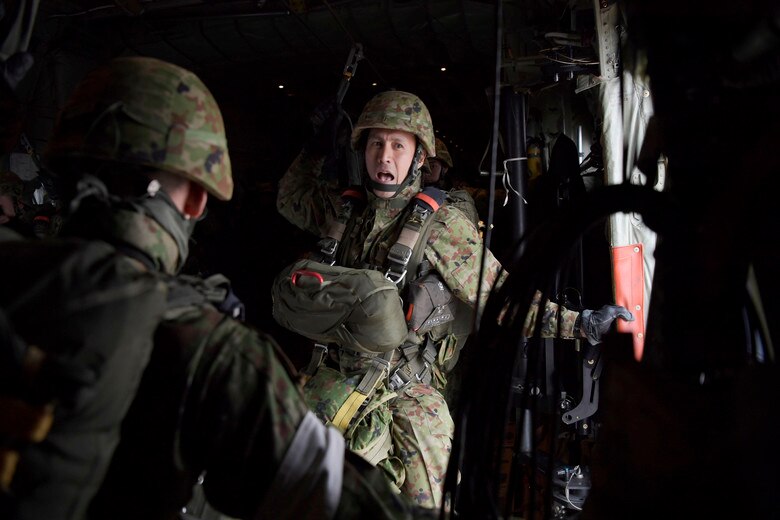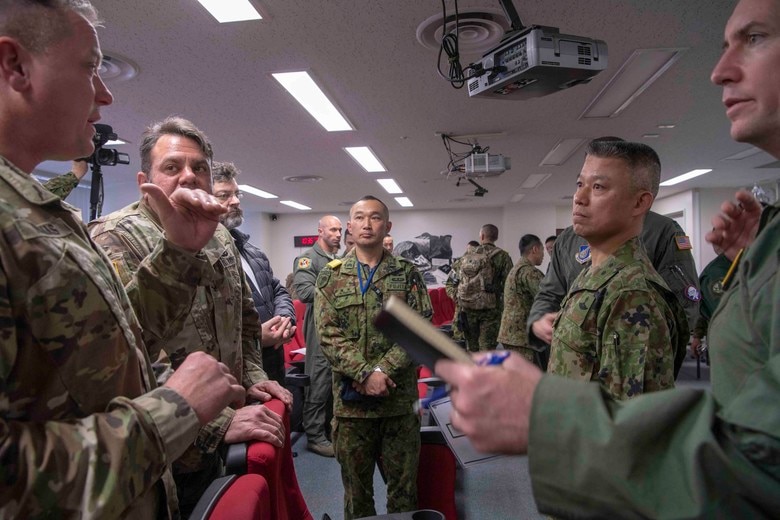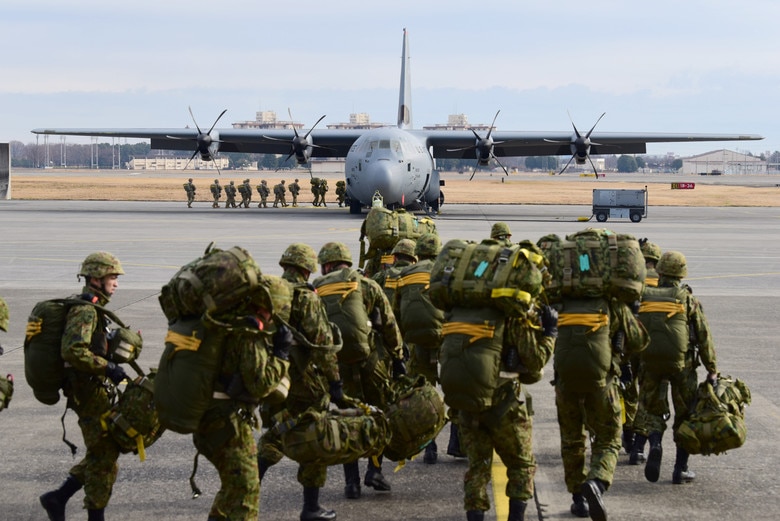Three U.S. Air Force C-130J Super Hercules aircraft from the 36th Airlift Squadron out of Yokota Air Base, Japan, participated in the Japanese forces annual New Year's Jump at Camp Narashino training area, Chiba, Japan, Jan. 12.
This is the first year the Air Force participated in the event featuring the bilateral collaboration between U.S. and Japanese forces, utilizing aircraft from both the Air Force and Japan Air Self-Defense Force and jumpers from the U.S. Army and the Japan Ground Self-Defense Force.
"The New Year's jump originally started back in the 1960s and became open to public viewing in the 1970s," said Capt. Robert Frisch, 36th Airlift Squadron project officer. "It is the prayer for safe deployment of chutes festival, where each year the JASDF and the JGSDF get together and show the public their capabilities to do a joint jump on a small drop-zone area. That drop-zone location is at Camp Narashino, which is right on the border of Tokyo and Chiba Prefecture. It is pretty much in the city, allowing lots of people to attend."
The JGSDF soldiers, 1st Airborne Brigade, along with U.S. Army Reserve Alaska and 82nd Airborne soldiers, jumped from the combined Air Force and JASDF aircraft, showcasing the combined bilateral military capability in a training environment.
"This is a team effort to successfully complete this event," said Col. Kevin Martin, 374th Operations Group commander. "It's important as we go forward, whether we are Air Force or Army, whether we wear a U.S. or Japanese flag, that we come together as a team.
"This is a New Year's celebration. Though the true reality is this shows a bilateral effort by the JGSDF, the JASDF, the U.S. Air Force and the U.S. Army to provide combat power."
The jump emphasized the U.S. and Japan's strong commitment to a free and open Indo-Pacific region, while showcasing the variety of aircraft both military are capable of utilizing.
"We have three C-130J's from the U.S. side, two JASDF C-130H Hercules, two C-1s and a C-2 all relatively close to each other dropping both U.S., Army and JGSDF together over a short period of time. It takes a lot of coordination to make that happen," Frisch said. "We can incorporate this type of training into literally anything else, be it landing on an island or any other scenario. We have shown we are capable of so much when we work together.
"The fact that we can have JGSDF and U.S. Army on our aircraft or on their aircraft, shows we can collaborate as one seamlessly. So, to see that happen and do a joint jump, where within just a few minutes we can get 300 combat-ready troops on the ground in a very small area, that's just really cool to be a part of."
This event is the first of the year for the Air Force but just the latest in a series of bilateral training exercises that, for decades, have increased the combat readiness and friendship between the U.S. and Japan.
"As the commander of the Japanese airborne troops," said Maj. Gen. Shigeo Kaida, JGSDF 1st Airborne Brigade commander. "I cannot think of a better way to work than to do this event with the U.S. and express my deep appreciation to every U.S. soldier and Airmen involved in this New Year's jump.
"This New Year's jump event isn't just another event; it was an opportunity to learn from each other and improve together. We understand there are many differences between us we may have to overcome and that makes this a complicated operation, but in overcoming those challenges, we increase our ability to conduct better airborne operations and that is the true value of what we did here today."

A Japan Ground Self-Defense Force paratrooper with the 1st Airborne Brigade approaches the open door of a C-130J Super Hercules aircraft over the Camp Narashino training area, Chiba, Japan, Jan. 12, 2020. The event consisted of three C-130J aircraft from Yokota Air Base, two Japan Air Self-Defense Force C-130H Hercules, two C-1s and a C-2, that dropped 301 U.S. Army and JGSDF jumpers. (U.S. Air Force photo by Staff Sgt. Taylor A. Workman)

Leadership from the U.S. Army, U.S. Air Force and Japan Ground Self-Defense Force discuss details from the safety brief for the New Year's jump at Yokota Air Base, Japan, Jan. 8, 2020. The training allows U.S. and Japanese units to work alongside one another while improving the readiness of our combined forces. (U.S. Air Force photo by Airman 1st Class Brieana E. Bolfing)

Japan Ground Self-Defense Force and U.S. Army troops file into a C-130J Super Hercules prior to the first bilateral jump event of the new year over Camp Narashino, Chiba, Japan, Jan. 12, 2020. The event consisted of three C-130J aircraft from Yokota Air Base, two Japan Air Self-Defense Force C-130H Hercules, two C-1s and a C-2, that dropped 301 U.S. Army and JGSDF jumpers. (U.S. Air Force photo by Staff Sgt. Taylor A. Workman)






